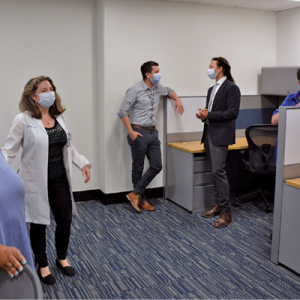A Champion for Affirming, Culturally Responsive Health Care
Understanding intersecting cultural identities — and providing care that respects and affirms those identities — is at the heart of Tyson Pankey’s work as a clinician, educator, and researcher. Pankey joined the Psychiatry & Behavioral Sciences faculty as an assistant professor in September 2021, after completing a post-doctoral fellowship at the Mayo Clinic in Rochester, Minnesota, where he specialized in transgender and intersex health and family medicine residency education.
2022 Michelle Winn Awards Celebrate Achievements in Diversity and Inclusion
Each year, the Winn Awards are presented to individuals from across the School of Medicine who have exemplified excellence, innovation, and leadership through helping to create a more diverse and inclusive environment.
Social Stress Factors Drive Cancer Mechanisms that Help Explain Racial Disparities
Chronically stressful conditions of daily life such as racism, pollution and poverty have a direct impact on the cellular mechanisms that drive lethal, invasive forms of breast cancer, according to a study led by Duke Cancer Institute researchers.
Kevin Thomas Looks to Lead School of Medicine Toward a More Equitable Future, and He’s Up for the Challenge
Kevin Thomas, the School of Medicine’s first vice dean for equity, diversity, and inclusion, understands the magnitude of the challenge of leading meaningful change at an institution of this size. But he’s faced plenty of challenges before, and he’s embracing the opportunity.
Values in Action: Creating a Place, and Climate for Discovery and Excellence
As it opens new spaces, the Duke Aging Center reaffirms its commitment to Duke’s values
Kenan Senior Fellow Calls on Bioethics to Address Racial Inequalities in Health Care
Patrick Smith is Associate Research Professor of Theological Ethics and Bioethics at Duke Divinity School. He also directs the bioethics program at the Trent Center for Bioethics, Humanities, and the History of Medicine.
Affinity Group Fosters a Sense of Belonging
The Asian American and Pacific Islander (AAPI) affinity group launched in April 2021 on the heels of the spa shootings in Atlanta.
Graduation 2022: Personal Experiences Push MD Graduate to Help Underserved Communities
Following commencement, Nwanaji-Enwerem will keep his knowledge and skills at Duke, launching a three-year residency in the Department of Family Medicine and Community Health.
Manuscript Emerging from DCRI Think Tank Outlines Actionable Steps to Improve Inclusion and Diversity in Clinical Trials
An industry emphasis on improving inclusion and diversity in clinical trials continues to grow, but strategies to achieve more balanced representation in research and clinical care remain elusive.









